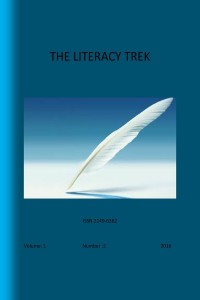“Teacher, is the exam difficult?” Students’ perceptions of difficulty in vocabulary assessment tasks
Abstract
It is common practise to assess vocabulary through multiple choice and matching tasks. While these tasks may appear to be a straightforward test of vocabulary, many factors contribute to students perceptions of difficulty, which in turn may influence performance. This study aims to identify factors which influence student perceptions of difficulty through a questionnaire which measures students’ perceptions of difficulty related to the test taker factors. The study, set in an EAP context, deals specifically with academic vocabulary, which presents challenges in terms of word form, multiple meanings, and morphology. The results reveal that neither of age, length of studying English, or faculty had any effect on guessing the meaning and the perception of difficulty in vocabulary tests; however, gender is a factor at the perception of difficulty.
Keywords
References
- References
- Bachman, L.F. (2003). Fundamental Considerations in Language Testing. Oxford University Press : Oxford.
- Brown, J. D., & Hudson, T. (1998). Alternatives in language testing. TESOL Quarterly 32(4), 653-675.
- Billuroglu, A. & Neufeld, S. (2005). In search of the critical lexical mass: How 'general' is the GSL? How 'academic' is the AWL? Retrieved 30-8-13from www.lextutor.ca
- Bulte, B., & Housen, A. (2012). Defining and operationalising L2 complexity. In A Housen, F. Kuiken & I.Vedder. Dimensions of L2 Performance and Proficiency: Complexity, Accuracy and Fluency in SLA. John Benjamins B.V Amsterdam
- Green, B. A. & Andrade, M. S. (2010). Guiding principles for language assessment reform: A model for collaboration. Journal for English for Academic Purposes 9, 322-334.
- Harrell, M. C. & Bradley, M. A. (2009). Data collection methods: Semi-structured interviews and focus groups. National Defense Research Institute.
- Hulstijn, J.H. & De Graaff, R. (1994). Under what conditions does explicit knowledge of a second language facilitate the acquisition of implicit knowledge?: A research proposal. AILA Review 11, 97-112.
- Laufer, B., & Goldstein, Z. (2004). Testing vocabulary knowledge: Size, strength, and computer adaptiveness. Language Learning 54(3), 399-436.
- Martinez, I. A., Beck, S. C., & Panza C. B. (2009). Academic vocabulary in agriculture research articles: A corpus based study. English for Specific Purposes 28(3),183-198.
- McNamara, T. (2001). Language assessment as social practice: challenges for research. Language Testing 18, 333-349.
- Pae, T-I. (2012). Causes of gender DIF on an EFL language test: A multiple-data analysis over nine years. Language Testing 29, 533-554.
- Read, J. (2000). Assessing Vocabulary. Cambridge: Cambridge University Press.
- Robinson, P. (2001). Task complexity, task difficulty, and task production. Applied Linguistics 22(1), 27-57.
- Satarsyah, C., Nation, P., & Kennedy, G. (1994). How useful is EAP vocabulary for ESP? A corpus based study. RELC Journal 25(2), 34-50.
- Ward, J. (1999). How large a vocabulary do EAP Engineering students need? Reading in a foreign language. Retrieved from http://eric.ed.gov/?id=EJ601601 27-8-13
- Webb, S. (2007). The effect of repetition on vocabulary knowledge. Applied Linguistics 28(1), 46-65. Doi: 10.1093/applin/am1048
- Yurekli, A. (2012). An Analysis of curriculum renewal in EAP Context. International Journal of Instruction 5(1), 49-68.
Abstract
References
- References
- Bachman, L.F. (2003). Fundamental Considerations in Language Testing. Oxford University Press : Oxford.
- Brown, J. D., & Hudson, T. (1998). Alternatives in language testing. TESOL Quarterly 32(4), 653-675.
- Billuroglu, A. & Neufeld, S. (2005). In search of the critical lexical mass: How 'general' is the GSL? How 'academic' is the AWL? Retrieved 30-8-13from www.lextutor.ca
- Bulte, B., & Housen, A. (2012). Defining and operationalising L2 complexity. In A Housen, F. Kuiken & I.Vedder. Dimensions of L2 Performance and Proficiency: Complexity, Accuracy and Fluency in SLA. John Benjamins B.V Amsterdam
- Green, B. A. & Andrade, M. S. (2010). Guiding principles for language assessment reform: A model for collaboration. Journal for English for Academic Purposes 9, 322-334.
- Harrell, M. C. & Bradley, M. A. (2009). Data collection methods: Semi-structured interviews and focus groups. National Defense Research Institute.
- Hulstijn, J.H. & De Graaff, R. (1994). Under what conditions does explicit knowledge of a second language facilitate the acquisition of implicit knowledge?: A research proposal. AILA Review 11, 97-112.
- Laufer, B., & Goldstein, Z. (2004). Testing vocabulary knowledge: Size, strength, and computer adaptiveness. Language Learning 54(3), 399-436.
- Martinez, I. A., Beck, S. C., & Panza C. B. (2009). Academic vocabulary in agriculture research articles: A corpus based study. English for Specific Purposes 28(3),183-198.
- McNamara, T. (2001). Language assessment as social practice: challenges for research. Language Testing 18, 333-349.
- Pae, T-I. (2012). Causes of gender DIF on an EFL language test: A multiple-data analysis over nine years. Language Testing 29, 533-554.
- Read, J. (2000). Assessing Vocabulary. Cambridge: Cambridge University Press.
- Robinson, P. (2001). Task complexity, task difficulty, and task production. Applied Linguistics 22(1), 27-57.
- Satarsyah, C., Nation, P., & Kennedy, G. (1994). How useful is EAP vocabulary for ESP? A corpus based study. RELC Journal 25(2), 34-50.
- Ward, J. (1999). How large a vocabulary do EAP Engineering students need? Reading in a foreign language. Retrieved from http://eric.ed.gov/?id=EJ601601 27-8-13
- Webb, S. (2007). The effect of repetition on vocabulary knowledge. Applied Linguistics 28(1), 46-65. Doi: 10.1093/applin/am1048
- Yurekli, A. (2012). An Analysis of curriculum renewal in EAP Context. International Journal of Instruction 5(1), 49-68.
Details
| Primary Language | English |
|---|---|
| Journal Section | Research Articles |
| Authors | |
| Publication Date | January 26, 2016 |
| Submission Date | January 26, 2016 |
| Published in Issue | Year 2016 Volume: 2 Issue: 1 |
 The content is licensed under a Creative Commons Attribution-NonCommercial 4.0 International License. Copyright rests with the author; The Literacy Trek must be referred properly.
The content is licensed under a Creative Commons Attribution-NonCommercial 4.0 International License. Copyright rests with the author; The Literacy Trek must be referred properly.


